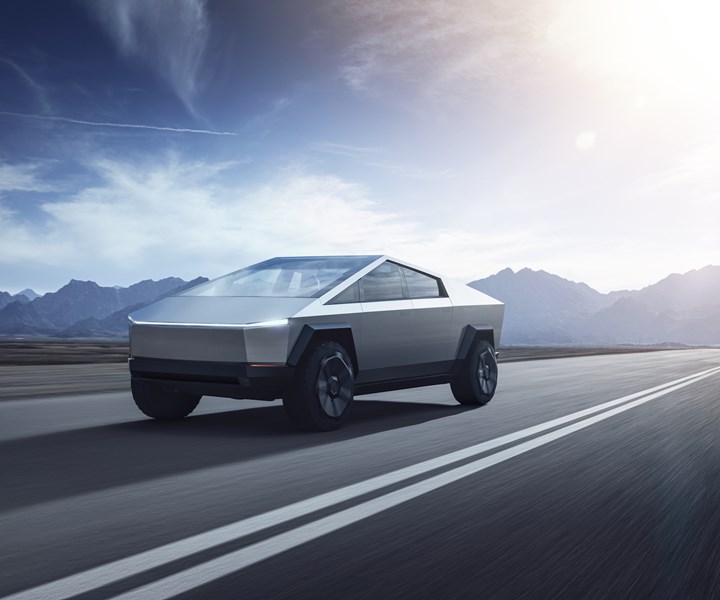The Auto Industry in 2019—and Beyond
What do events in 2019 portend for the industry’s future?
#economics #labor

The Tesla Cybertruck: One of 2019’s biggest automotive stories—and it doesn’t really exist yet! (Image: Tesla)
As 2019 comes toward its conclusion, for this edition of “Autoline After Hours” we decided to do something a little different. We got two analysts/consultants in the studio, guys who know an incredible amount about (a) what’s happened, (b) why it’s happened, (c) what it means, and (d) a whole lot more, and simply spent the hour talking with them.
Joining my co-host John McElroy and me are IHS Markit’s Joe Langley, who leads the firm’s North America production forecast team, and Paul Eichenberg of Paul Eichenberg Strategic Consulting (yes, who happens to be a columnist for AD+P).
Know This:
And here are two takeaway quotes that encapsulate what the hour-plus conversation is about:
“Technology is driving the change in the OEM model.”—Eichenberg
“No one can go it alone.”—Langley
The points of those two are derived from a few key topics that are discussed.
The Details About That
First of all, we look at Tesla. 2019 was an important year for the company. The day the show was aired the stock price for the company passed $400 a share. The company’s plant in China is building vehicles. The Model 3 production seems to have ramped in the Fremont, California, plant. Tesla started offering car insurance in 2019. And the Cybertruck was still making waves weeks after its unveiling.
Eichenberg thinks that Tesla is truly transforming the auto business, in large part because of its emphasis on technology and its creation of an infrastructure (charging network; the insurance offering). He notes that the company is collecting massive amounts of data from the hundreds of thousands of vehicles that it has on the road, which should allow the company to develop autonomous capabilities (beyond those that it ostensibly offers right now), which could lead to the company creating a robo-taxi business—something that Eichenberg also thinks is being pursued by General Motors through its GM Cruise Automation and Ford via Argo AI.
There’s a key part of the change in the OEM model.
The Money Connection
But in order to do that, there is a tremendous investment that must be made by all companies, especially legacy manufacturers like GM and Ford. So we’re seeing investment in Cruise by Honda. And so this past July Ford and Volkswagen announced that they were expanding their alliance. One way this is happening is that VW is investing $2.6-billion (in money and resources), which will make it an equal partner with Ford in the undertaking.
That’s a key part of the “no one can go it alone.”
What’s more, given the closer connections that are largely being driven by the technological imperative, it may be the case that there will be stronger tie-ups between companies. . . as the FCA-PSA merger.
However, this may result in a company that has a different approach toward the market than GM and Ford may have.
The Three Types of OEM Approaches
That is, Eichenberg maintains that there are likely to be three types of OEM companies in the not-too-distant future.
The first will be the companies that are producing vehicles for urban, autonomous fleets as their primary approach. The second is the auto manufacturer being something like an Airbus or Boeing is to the airline industry: builders to someone else’s spec. And finally, there will be luxury vehicle manufacturers.
Eichenberg suggests that the combined FCA-PSA will be in the second category, as to this point the two companies have not shown the kind of investments into tech that other companies have made.
And along the way, we talk about the GM strike, Daimler and BMW, Toyota’s approach to all of this, and a whole lot more. All of which you can see right here.
RELATED CONTENT
-
Jeeps Modified for Moab
On Easter morning in Moab, Utah, when the population of that exceedingly-hard-to-get-to town in one of the most beautiful settings on Earth has more than doubled, some people won’t be hunting for Easter eggs, but will be trying to get a good look at one of the vehicles six that Jeep has prepared for real-life, fast-feedback from the assembled at the annual Easter Jeep Safari.
-
Increasing Use of Structural Adhesives in Automotive
Can you glue a car together? Frank Billotto of DuPont Transportation & Industrial discusses the major role structural adhesives can play in vehicle assembly.
-
Engineering the 2019 Jeep Cherokee
The Jeep Cherokee, which was launched in its current manifestation as a model year 2014 vehicle, and which has just undergone a major refresh for MY 2019, is nothing if not a solid success.


.jpg;width=70;height=70;mode=crop)






